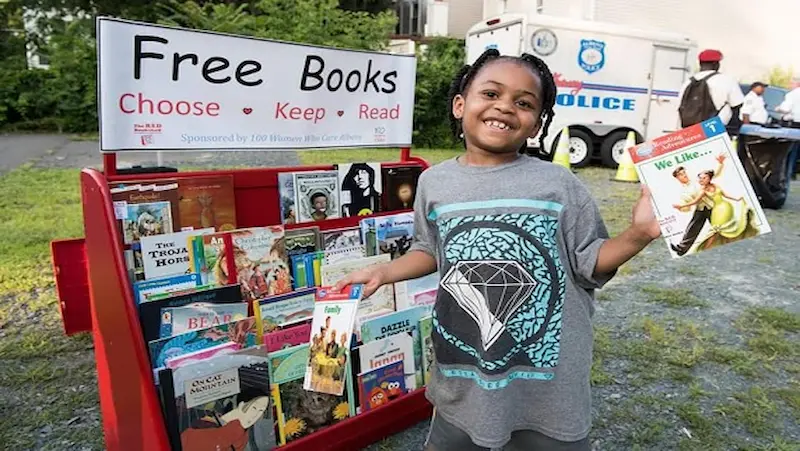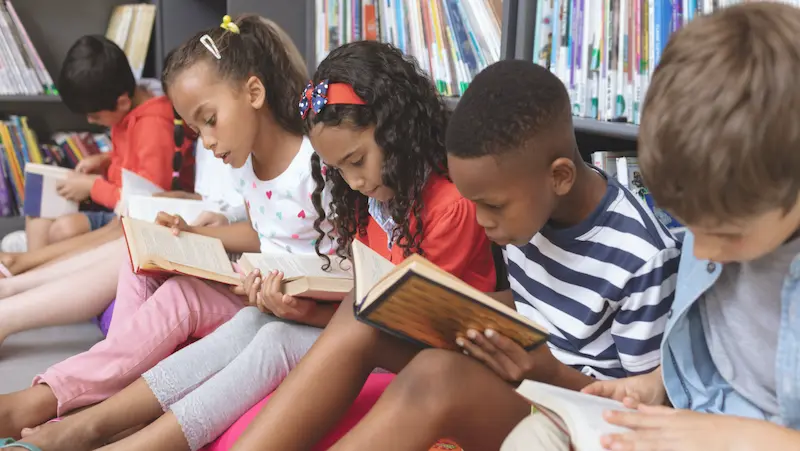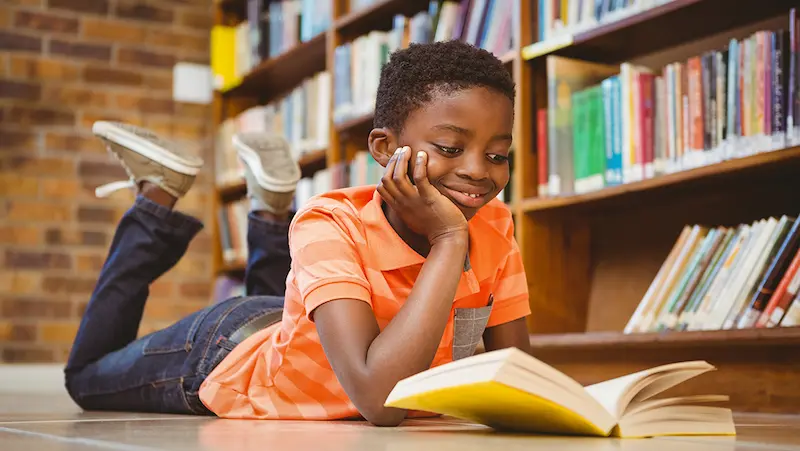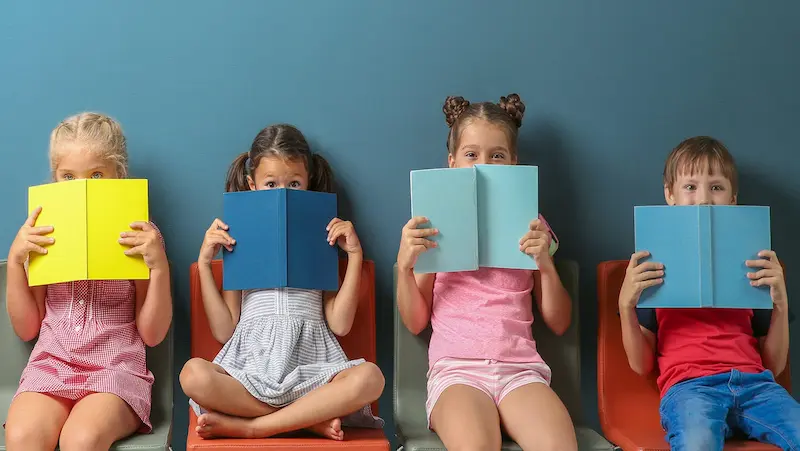In a world brimming with screens and digital distractions, the simple act of reading holds a timeless power, especially when it comes to children. As a gateway to imagination, knowledge, and personal growth, reading serves as a crucial foundation for a child’s development. From the earliest years of their lives, the ability to access books freely can have a transformative impact on young minds, paving the way for a brighter future.
In this fast-paced, ever-evolving society, where technological advancements shape the way we live and learn, the importance of reading for kids remains unwavering. By ensuring that kids have access to free books, we not only cultivate their love for reading but also empower them to become lifelong learners, critical thinkers, and compassionate individuals who can positively impact their communities.
In this blog, we will look at a wide range of free books that kids can enjoy! So, let’s get started!
Table of contents
Why Choose Free Books for Kids?
Books have always been a gateway to knowledge, imagination, and personal growth. They offer insights into different cultures, perspectives, and ideas, allowing us to expand our horizons and delve into new worlds.
While traditional bookstores and libraries have been the primary sources for reading material, the advent of digital technology has revolutionized the way we access books. One notable development is the availability of free books, which provide numerous advantages for readers.
You can find excellent coding resources to introduce your children to the world of technology. From fun coding games for kids to interactive online coding classes, there are plenty of opportunities to learn coding languages like Python. Explore the best coding apps and websites for kids, and even find free coding programs and coding boot camps for kids. Let your kids’ creativity flourish as they embark on an exciting journey of learning coding, programming, and website building at their own pace.
In this blog post, we will explore the benefits of free books, focusing on their accessibility, affordability, and the opportunity to discover new authors and genres.

Accessibility
One of the most significant advantages of free books is their enhanced accessibility. In the digital era, anyone with an internet connection and a device can access an extensive collection of free e-books from various platforms. This eliminates the barriers of distance, travel, and physical availability that were often associated with traditional bookstores and libraries.
Free e-books can be downloaded and read on smartphones, tablets, e-readers, or computers, allowing readers to carry an entire library in their pockets. This increased accessibility ensures that individuals from different regions, socio-economic backgrounds, and age groups can enjoy reading and benefit from the wealth of knowledge that books offer. Parents often choose free parenting books for kids because they provide valuable insights and guidance on child-rearing without the added expense, allowing them to access helpful resources without straining their budget.
Affordability
Books can be expensive, especially when considering the costs of purchasing new releases or maintaining a personal library. Free books alleviate the financial burden associated with reading, making literature accessible to those who may not have the means to invest in books regularly.
Many online platforms, such as Project Gutenberg, Open Library, and various independent authors’ websites, offer a vast selection of free e-books, ranging from classic literature to contemporary works. This affordability factor enables readers to explore diverse genres, discover new authors, and broaden their reading preferences without worrying about the monetary constraints.
Opportunity to Discover New Authors and Genres
The availability of free books presents an excellent opportunity to explore new authors, genres, and writing styles. When books are easily accessible and don’t come with a financial commitment, readers can take risks and venture into uncharted literary territories. They can discover emerging writers, explore niche genres, or delve into non-mainstream literature without the fear of wasting money on a book they may not enjoy.
Free books enable readers to broaden their horizons, challenge their preconceptions, and foster a love for diverse voices that they may have overlooked otherwise. Moreover, this exploration of new authors and genres can lead to the discovery of hidden gems and future favorite authors that readers may want to support and invest in further.
How to Find Free Books for Kids
Reading is a powerful tool that nurtures a child’s imagination, enhances language skills, and fosters a love for learning. As a parent, you play a crucial role in cultivating your child’s reading habit. However, purchasing books can be expensive, making it challenging to provide your children with a diverse range of reading materials.
Fortunately, there are numerous avenues available to access free books, such as public libraries, online platforms, and community book exchanges. In this blog, we will explore practical tips and resources that parents can utilize to make reading an accessible and enjoyable experience for their children.

Public Libraries
Public libraries are treasure troves of knowledge, offering a vast collection of books for readers of all ages.
Here’s how you can make the most of your local library:
Library membership: Encourage your child to obtain a library card. It grants access to an abundance of free books and resources. Most libraries have age-appropriate sections for children, making it easier to discover books suitable for their reading level.
Storytime sessions: Attend library-hosted Storytime sessions where librarians read aloud to children. These interactive sessions engage young readers and expose them to different genres and authors. Public libraries offer a wide selection of bedtime stories for kids, providing a wonderful opportunity for families to discover and share enchanting tales together before settling down for a good night’s sleep.
Book clubs: Join or start a book club for children in your community. Book clubs encourage reading, facilitate discussions, and introduce children to new perspectives.
Online Platforms
The digital age has expanded access to free books through various online platforms.
Here are a few notable resources:
Project Gutenberg: This online library offers over 60,000 free e-books, including classics, in multiple languages. The collection spans various genres and is accessible on computers, e-readers, and mobile devices.
Open Library: Open Library is an initiative that aims to provide free and open access to books. It offers a vast digital collection that can be read online or borrowed for a limited time. It also collaborates with libraries worldwide to increase the availability of e-books.
Librivox: Librivox provides free audiobooks of public domain works. This platform relies on volunteers who narrate and record the books, making it a valuable resource for children who prefer listening to stories.
Community Book Exchanges
Engaging with local book exchange initiatives fosters a sense of community and allows for book sharing.
Consider the following options:
Little Free Libraries: These small, outdoor book-sharing boxes are becoming increasingly popular. They encourage individuals to take a book they’re interested in and leave one in return. Check if there are Little Free Libraries in your neighborhood or consider starting one yourself.
Book Swaps: Organize book swaps within your community or school. Invite parents and children to bring books they have already read and exchange them with others. This provides an opportunity to discover new titles while promoting recycling and sharing.
Online book swapping platforms: Several websites facilitate book exchanges, allowing parents to swap books with others across different locations. By joining these platforms, you can diversify your child’s reading options without spending money.
Reading Recommendations for Different Age Groups
Books have an extraordinary power to captivate young minds, fostering imagination, knowledge, and empathy. When it comes to selecting books for children, it’s crucial to consider their age and developmental stage. By choosing literature that aligns with their abilities and interests, we can ignite a lifelong love for reading.

In this blog, we will divide the sections into age ranges, from toddlers to early readers, and suggest suitable books for each group. Let’s embark on a literary journey that nurtures young minds!
Toddlers (Ages 1-3)
During the toddler stage, children are exploring the world around them with boundless curiosity. Bright illustrations, simple narratives, and interactive elements make books come alive for these young readers.
To encourage healthy eating habits, parenting tips for toddlers suggest offering a variety of nutritious foods and being a positive role model.
Here are a few suggestions:
“Goodnight Moon” by Margaret Wise Brown: This classic bedtime tale, with its rhythmic prose and soothing illustrations, engages toddlers as they bid goodnight to the objects in their own world.
“Where’s Spot?” by Eric Hill: Lift-the-flap books like this one encourage participation and teach early concepts like hiding and finding. The lovable puppy Spot is a delightful companion for interactive reading sessions.
“Brown Bear, Brown Bear, What Do You See?” by Bill Martin Jr. and Eric Carle: With repetitive text and vibrant illustrations, this book introduces toddlers to colors and animals, enhancing their vocabulary and visual recognition skills.
Preschoolers (Ages 3-5)
Preschoolers have an expanding vocabulary and are eager to explore new concepts. They are developing their own interests and preferences. Engaging stories with relatable characters and gentle life lessons are perfect for this age group.
With colorful blocks and simple instructions, coding toys for preschoolers make learning computational thinking fun and accessible.
Here are some recommendations:
“The Very Hungry Caterpillar” by Eric Carle: This beautifully illustrated book takes children on a journey through the life cycle of a caterpillar, teaching them about numbers, days of the week, and healthy eating habits.
“The Gruffalo” by Julia Donaldson: This captivating tale of a clever mouse outsmarting dangerous creatures in the deep, dark woods combines rhyming text and captivating illustrations, fostering imagination and problem-solving skills.
“Corduroy” by Don Freeman: Follow the adventures of a small bear named Corduroy as he searches for a home and discovers the power of friendship and acceptance. This heartwarming story promotes empathy and kindness.
Early Readers (Ages 6-8)
As children enter the early reader phase, they are ready to take their first independent steps into the literary world. Books that balance engaging narratives with age-appropriate language and slightly more complex plots are ideal for this stage.
Here are a few suggestions:
“Frog and Toad Are Friends” by Arnold Lobel: This charming collection of stories follows the adventures of two inseparable friends, Frog and Toad. The relatable characters and gentle humor make it an excellent choice for emerging readers.
“Magic Tree House” series by Mary Pope Osborne: This beloved series combines history, adventure, and time travel. Join Jack and Annie as they embark on thrilling quests, introducing young readers to various periods and cultures.
“Charlotte’s Web” by E.B. White: A timeless classic, this story of friendship between a spider named Charlotte and a pig named Wilbur explores themes of compassion, loyalty, and loss. Its rich language and heartfelt narrative make it a perfect choice for early readers.
Benefits of Reading for Kids
Reading is a magical gateway that opens up a world of possibilities for children. Beyond its obvious benefits, such as improved literacy skills, reading offers an array of advantages that shape young minds, fuel imagination, and expand knowledge.
In this blog, we will explore the profound impact of reading on children, delving into the realms of improved literacy, enhanced imagination, and expanded knowledge.

Improved Literacy Skills
Reading is the cornerstone of language development and literacy skills. By regularly engaging with books, children are exposed to new words, sentence structures, and concepts. They expand their vocabulary, develop a stronger command of grammar, and grasp the nuances of language.
Reading introduces children to different writing styles and genres, helping them understand the art of storytelling and fostering their own creative expression. These foundational literacy skills are crucial for academic success, effective communication, and lifelong learning.
Enhanced Imagination
Books have an enchanting ability to transport children to new worlds, spark their imagination, and ignite a sense of wonder. As children immerse themselves in stories, they develop the power to visualize characters, settings, and events, stimulating their creative faculties.
Through reading, children can explore diverse cultures, historical periods, and fantastical realms, expanding their perspective and encouraging empathy. Imagination cultivated through reading fuels innovative thinking, problem-solving abilities, and the capacity to dream big.
Expanded Knowledge
Reading is an endless source of knowledge and information. Whether children devour fiction or delve into non-fiction, every book offers a treasure trove of ideas and facts waiting to be discovered. Fictional narratives expose children to different human experiences, emotions, and moral dilemmas, fostering their understanding of the world and nurturing empathy.
Non-fiction books empower children to explore a wide range of subjects, from science and history to geography and biographies, broadening their horizons and deepening their understanding of various disciplines.
Cognitive Development
Reading is not merely a passive activity but an active process that engages the mind. As children read, they develop critical thinking skills, expand their capacity for analysis, and hone their ability to make connections. They learn to question, predict, infer, and draw conclusions, fostering their cognitive development. Educational activities and games can stimulate child cognitive development and enhance their intellectual abilities.
Reading also improves concentration and focus, as children become engrossed in the narrative and follow complex storylines. These cognitive benefits spill over into other areas of learning, facilitating academic achievement and problem-solving abilities.
Emotional and Social Growth
Books are a powerful tool for emotional and social growth. Characters in stories help children navigate their own emotions, develop empathy, and build resilience. Reading exposes children to diverse perspectives and cultures, fostering inclusivity and understanding.
It provides a safe space to explore complex emotions, such as fear, love, and loss, and offers valuable lessons about empathy, kindness, and friendship. Furthermore, reading together with parents, siblings, or friends promotes bonding, encourages communication, and strengthens relationships.
Conclusion
In conclusion, we strongly encourage parents to explore our website and take advantage of our extensive collection of free books. Our platform is designed to provide a valuable resource for parents seeking quality reading materials for their children.
By offering a diverse range of books across various genres and age groups, we aim to foster a love for reading and promote literacy among young minds. Through our user-friendly interface, parents can easily navigate the website and discover a wealth of engaging stories, educational content, and interactive features.
Our commitment to curating high-quality, age-appropriate books ensures that parents can feel confident in the materials they find on our platform. Furthermore, we believe in the power of sharing knowledge and resources within a community. We encourage parents to spread the word about our website and share it with other parents who may benefit from accessing our free book collection. Also, Free coding for kids allows young learners to create their projects and see their ideas come to life through code.
By doing so, we can create a network of support and empowerment, where parents can exchange ideas, recommendations, and experiences related to reading and education.
In today’s digital age, it is crucial to leverage the power of technology to enhance children’s learning experiences. Our website offers an accessible and convenient avenue for parents to expose their children to a wide range of literature, fostering curiosity, creativity, and critical thinking skills. By encouraging parents to explore our website and share it with others, we can collectively contribute to the development of well-rounded, intellectually curious individuals.
Elevate your child’s learning journey with BrightChamps, the leading EdTech company that offers a transformative blend of robotics, financial education, and coding courses for kids.
Frequently Asked Questions
A1: There are several resources available for free children’s books online. You can check out websites like Project Gutenberg, Open Library, and BookBub for a wide range of free books.
A2: Yes, you can find free books for kids of all age groups. Websites often categorize books by age or provide filters to help you find age-appropriate books for your children.
A3: Yes, most websites offering free children’s books are mobile-friendly. You can access and read these books on your mobile device or tablet.
A4: While some websites may require you to create an account, many provide free books without any registration. Check the website’s terms and conditions to see if an account is necessary.
A5: Yes, some websites allow you to download the free books and read them offline. Look for options like PDF or EPUB downloads on the website.
A6: Yes, the websites mentioned provide free books that are legally available for public use. They often offer books in the public domain or with the permission of the authors.
A7: While not all popular children’s books may be available for free, you can find a vast collection of classic and lesser-known titles for children at no cost.
















